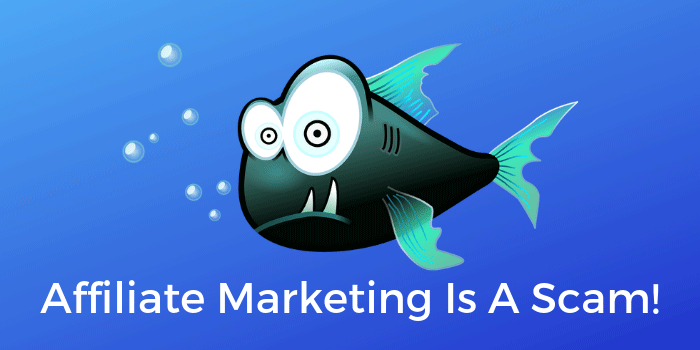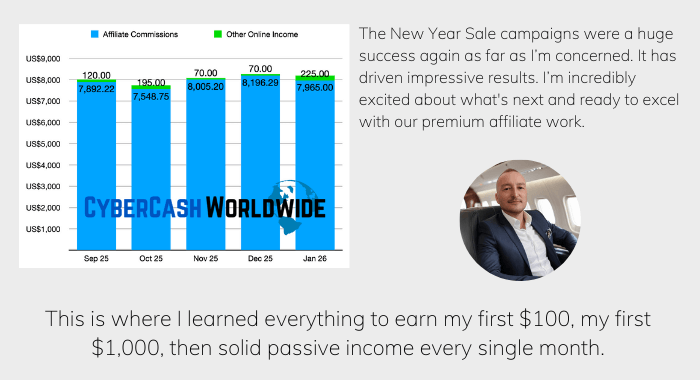Affiliate marketing is a scam. Affiliate marketers are biased, phony, ostentatious, and patronizing. Everyone but myself and a few friends of mine in the same business.
Well, it feels like it when a friendly man who pretends to know nothing approaches me, very politely asks me to take him through step by step. After 3 days of questions and answers, all of a sudden he tries to sell me a cryptocurrency. When I tell him that I know enough people who are crypto-affiliates, he says to me, "Be careful, there are so many scammers out there."
Tu tambien. Lol.

5 Common Affiliate Marketing Scams
You can tell when someone appears out of nowhere, is overly friendly, keeps asking about your family, life, the weather, and all that - just tell me what you want, you know. But this time, this man really got me.
Anyway, today I've listed 5 of the common affiliate marketing scams that you should really be aware of.
#1 Anyone Who Push-Sells Investments (Crypto-Scammers)
Financial advisers are different from 'independent' financial advisers, you know. They work for commission, and they don't necessarily act in your best interest. When you buy an investment plan, you do your research as much as you can, understand how the plan works, and listen to several people's advice before making your own decision, right?
Whether cryptocurrencies or any other type of online investments, anyone who push-sells (approaches you by chat, email or via social media DMs and recommends a particular product/program) should be ignored. Good affiliates - investment advisers - don't have to randomly contact people to make money. People who need advice will find it.
Scam-spotting Tip
Anyone who messages you to ask how you are, but doesn't tell you what they're messaging you for in the first instance. They're cold-calling, don't waste a minute with them.
#2 Affiliate Marketing Focused On No Product

There's an MLM (multi-level marketing) and there's also a Pyramid Scheme. They both have a multi-tier commission structure. You are encouraged to join a fairly expensive membership, but to recruit someone else to receive a commission. And if the person you recruited recruits another person, you'll receive a share of the commission, and so on.
The difference between an MLM and a Pyramid scheme is, simply put, that an MLM promotes products, services, and other things. Whereas a pyramid scheme doesn't. It's entirely focused on recruiting people, therefore considered illegal in many countries.
"Pay me and join my circle, but if you let others join us, you'll get paid a huge commission too."
Many MLMs are effectively pyramid schemes. They sell products, services, whatever...things to make their scheme appear to be within the law. But their sales tactics are focused on the commission structure itself.
"Buy this product from me. This thing is great, whatever it is. And if you sell it to others, you'll get paid a huge commission too."
Scam-spotting Tip
If someone barely describes the product - what it is, what it does, and how the product can benefit you - but keeps going on about your potential earnings, then it's a scam. Don't be blinded by the diagram with lots of multiplication signs. (e.g. $50 x 4 referrals x 16 sub-referrals x 12 months = $38,400! This is how much you can make within a year!)
Also note that they don't necessarily offer a multi-level commission system. It can be a single-tier.
#3 Get-Rich-Quick Schemes
Here we go, I couldn't help but list this one. Because frankly, get-rich-quick schemes are all scams. All of them. Not a single exception. No matter what the "brand new method" that they offer or no matter how cheap the product is, you will never make hundreds of dollars in the next 24 hours or thousands of dollars in the next 7 days.
Or, strictly speaking, you might make thousands of dollars if you pay thousands of dollars. You will spend a lot more money than you receive.
One type that you often see is a so-called "done-for-you system". They've already created a website for you; all you have to do is send traffic to the site, so that you'll make thousands of dollars as an affiliate within the next X days.
What they don't tell you is that the most crucial element of affiliate/digital marketing is about sending traffic. "All you have to do" is what everyone else is struggling to do day in, day out. If you want to make that kind of money in such a short period, you need to pay a serious amount of money for the traffic - tens of thousands of dollars. If you're lucky, your actual profit will be very little. Otherwise, you'll most likely make a loss.
And you know, done-for-you systems are typically sold for something like "worth $4,997 but today only, one-time fee of $47", so they say!
Scam-spotting Tip
Don't believe any "newly discovered" money-making systems. If it were so revolutionary and eye-opening, you wouldn't be the first one to be revealed to. The media would be. Google it, and within minutes you'll know it's a scam.
#4 Traffic Service Scams

Traffic service scammers often claim that they send traffic to any of your affiliate webpages in any niche, and charge very low prices from $0.01 - $0.20 per visit. They would often say their service is especially suitable for "new" business owners and "new" affiliates, without explaining why. Suitable for newbies because what they actually send is bot traffic, and inexperienced customers are unlikely to find that out and complain.
The visitors to your lead generation page will be bots, and some bots are intelligent enough to opt-in (i.e., become your subscribers). Subsequently, when you send your email newsletter, some of your bot subscribers may even click your link. But of course, robots will never make any purchases. You see how awful that would be? They would appear to be your "active subscribers" because they open your emails and click the links. But they're robots!
I wouldn't use a traffic provider who claims that they can send traffic to "any niches". Because nobody ever has a list of potential customers for each and every niche, unless it's a tremendously large company with millions and millions of contacts (which doesn't really exist!)
The majority of traffic providers serve affiliates who are in the "make money online" niche. Some others deal with a health niche and a love/relationship niche, but rarely will anyone serve traffic to any other niche sites. If your affiliate niche is something other than make-money, health, or relationships, for example, gadget/technology, it's not worth looking for paid traffic services.
As for the price, the lowest market price (among legitimate traffic providers) is around $0.40 per visit for a business opportunity niche and the highest can be $1 per visit or more. I wouldn't use a service if someone's charging less than $0.30 per visit.
Scam-spotting Tip
This is so subjective, and it's hard to spot scammers, but one thing you can do before you buy traffic is contact the seller and ask some open-ended questions (questions that cannot be answered with yes or no). See how friendly and helpful they are. For example;
- When is the best time for me to receive your traffic?
- How long will the visitors stay on my page (before they opt-in or leave)?
There's no straightforward answer to either of these questions - the short answer is "it depends." But if they try their best to explain it to you, they're showing they care. If their answer is abrupt, don't buy it from them.
#5 Overpriced Affiliate Marketing Courses
I'm not talking about high-profile courses by well-known tutors. Most of the reputable courses are for digital marketing in general anyway, not specifically for affiliate marketing. And people do pay for the quality.

What's overpriced is when a package is sold for a one-time fee of say, $100, consisting of video tutorial modules, ebooks, and templates. It's likely to be a PLR product with resell rights attached. It means the creator of the package is unknown, and anyone can sell it for any price they want. In this case, the person who's selling it for $100 is effectively a scammer because the quality is not up to scratch, and it's not even a training course.
For example, I've recently seen an affiliate marketing sales package called "High Ticket Sales Secrets" - I've seen it sold as a training course for $47, and also sold by someone else for much cheaper price, $7. Then I googled it and managed to get it from another site for free. It wasn't a training package, but it was an outdated "done-for-you" template.
I wouldn't advise you to pay a one-time fee for a training package. Because the marketing trends change quickly, so do Google algorithms, so do Amazon affiliate rules, and so on. You don't want to pay for what may have been produced last year.
I wouldn't pay $10 for merely an "introduction to affiliate marketing" ebook either if I were you, because you wouldn't even get what you pay for - the very basics how-tos can easily be obtained by searching online for free.
Affiliate marketing itself is accessible to anyone because it requires very little initial investment. You need your website hosted, and depending on how you market it, you need a keyword tool, a video/graphics editing tool, and an email marketing tool. You shouldn't have to pay more than $50 per month for all the tools combined.
What you should invest in is a decent training course, but you want to make sure the quality of it before making your first payment - always try a course that offers a free trial.
Scam-spotting Tip
Check the names of the ebooks that are included in whatever the "training course" package is, and Google the name. It may be just a PLR product that's available for free elsewhere.
Legitimate Affiliate Marketing
If you want to learn the most consistent and reliable way of affiliate marketing without being scammed - and this is also important, without knowingly scamming anyone - join me. This is where I learned all the techniques to earn $5,000+ per month as an affiliate. We'll take you through step-by-step!
Any questions, don't hesitate to ask by leaving your comment below.



I am interested in reading your website. The articles are always insightful. I have been scammed by affiliate marketers so many times before and I would like to write about it. It will be interesting for your readers. Can I please submit my post, if so can you tell me how long it will take for you to publish? I am looking forward to hearing from you.
Hi Hannah, sure. Contact us and we can discuss it. We can publish it if your content is real and raw. But how on earth you’ve been scammed “so many times” anyway?
I was scammed more than 10 times by affiliate marketers, I lost more than 800 dollars.
What can you do about this..
Hi Judy, sorry to hear that, I hope you’ve learned something from your experiences at least…!
I was on a technical learning online class because i wanted to know more about internet business using computer but I was scammed. they say AI will do things like marketing and SEO so I didn’t need to worry but it was all lies. I no longer trust any courses.
Sorry to hear that, but how did you get scammed, in what way?
This is a very good information for anyone who has been scammed before. I was scammed a few times by fake make money online programs and when I found out there was no one to help me. My focus was to recover all my lost money but I had no idea what to do. There are too many scammers out there that everyone has to be careful of. If you don’t read more than a few reviews and make the most sensible decision you will be easily scammed by very clever scammers. Watch out for your bank accounts because if you give out all your information they can access your account and steal money from you. I am extra cautious about them now. Your article helps us all. We should all learn about these 5 different scammers and stay put.
Hi Mason, thanks for your comment, and sorry to hear that you’ve lost some money to fraudulent programs. I agree with you about giving out your bank details too. Although your bank should take responsibility and refund money if your account’s been genuinely hacked. I wish you all the best. Thanks for your input!
I would say 90%+ of affiliate marketers are scammers. But only because most of them don’t learn the right way and they never make a success. I hear from somewhere that over 80%+ of online marketers never make $100. I think because they try to scam people without knowing it. Without being helpful and consistent you will never make a legitimate affiliate marketer.
Hi, thanks for your comment. I’m not sure if I would say 90%, but I do agree with you, if you don’t learn how to help people but focus on hard-selling, you’ll go down the same road, end up scamming.
Hi Ray, your scam-spotting tips are real “spot on”. I can learn a lot from them.
Especially I didn’t know about traffic scams. I have bought some traffic before and I hope I didn’t get scammed without knowing. But in the future I know how I can be careful.
About crypto currencies I have no interest but I get a lot of invitations also. I just say no but some of them are persistent. I know I just have to keep ignoring them.
Thank you for all your tips. They are very useful.
Hi Hitesh, thanks for your comment. It is very hard to spot bot opt-ins, even email marketing software companies cannot verify them. You just have to monitor your list if you are email marketing for their responsiveness (open/click rates). And check who has sold you many dead leads.
I like your website and like your very funny sense of humor. but I agree with you say on this page. I hate MLM’s and I don’t like people who are after get rich queick scheme but no willingness to work. They don’t work in real life then they can’t work online either.
Great post.
Hi Ryann, thanks for your comment. You’re right, there is no easy way in online business. They say all you need is a laptop and internet connection. While they’re all you need, the amount of work you have to put in can be enormous.
Great tips, and I love the illustrations that you make. Do you draw yourself. How do you make them?
I don’t see many cryptocurrency scammers now maybe it’s going down it’s a good thing.
Because they were so annoying they never let me go.
Hi Mani, thanks for your comment. Crypto-prices seem to be fluctuating a lot nowadays and perhaps that’s the reason we don’t see as many affiliates as we used to? I’m only guessing, but it’s good to see less of them. Thanks for your compliment on the images – they’re all royalty free illustrations. I just add text using Canva.com.
I never considered anyone who can provide a training course a scam until recently that my online tutor suddenly stopped supplying training materials. I thought he had a problem but then he became unapproachable. My course was not as expensive (less than $80) but now I know there are some training scams.
Hi Amy, thanks for your comment. Sorry to hear your story. I hope you can get some (or all!) of your money back via card company or PayPal, Dispute it if you haven’t!
All affiliate marketers are scams. They write their twisted version of opinions in the name of a review but all they want is sell. I don’t trust any of them. If I’m interested in something I go straight to online store websites. Don’t believe any of affiliate marketers.
Hi Indila, thanks for your comment. I’m sorry to hear that you feel that way. Not all affiliates are biased though. We’re here to help users and genuinely enjoy helping them, believe it or not!
Hi, I found your article very interesting. Especially about traffic services is something that I had no knowledge of. I have never used a paid traffic service, but I have tried to in the past and gave up because I didn’t know how much I could trust them. If I ever need one, I really need your help. Maybe you can write another page dedicated to tips & advice. Thank you for your article.
Hi George, thanks for your comment. You shouldn’t have to use paid traffic services if you consistently publish your content (blog/vlog) but by all means, if you need any help don’t hesitate to ask at any time 🙂
Digital marketing is oversold. Sure, it works for some, but most end up spending more on ads and tools than they make in profit. This post oversimplifies the hard truth about it.